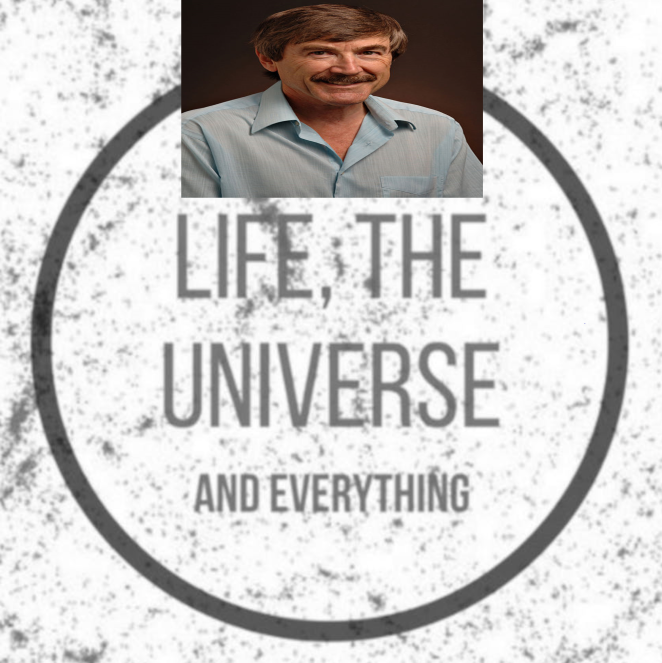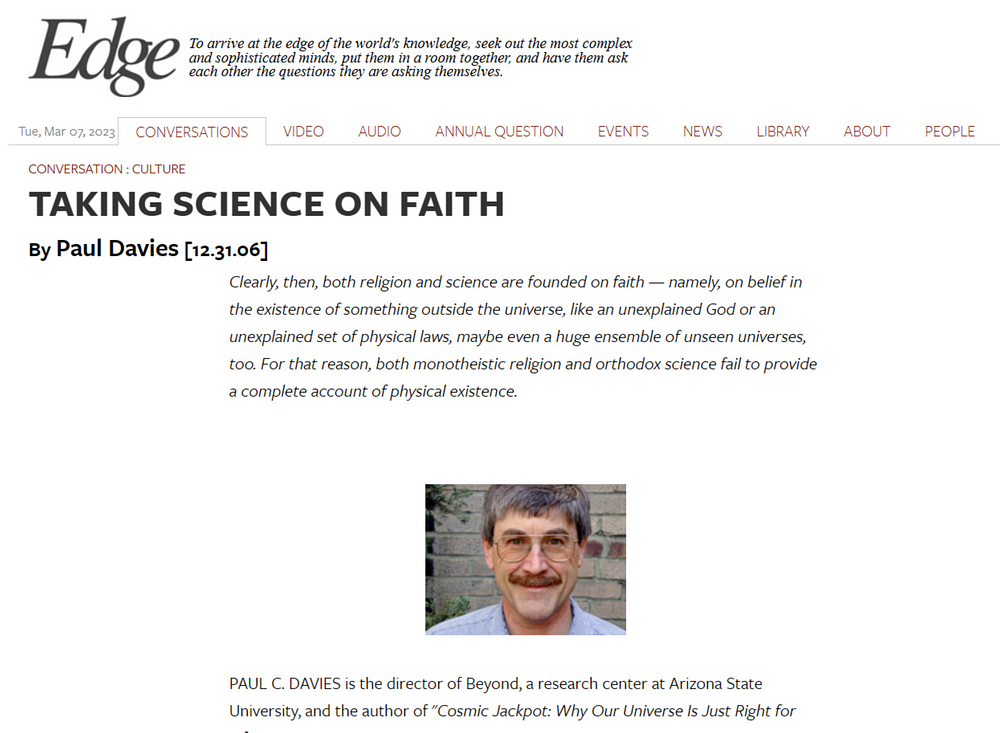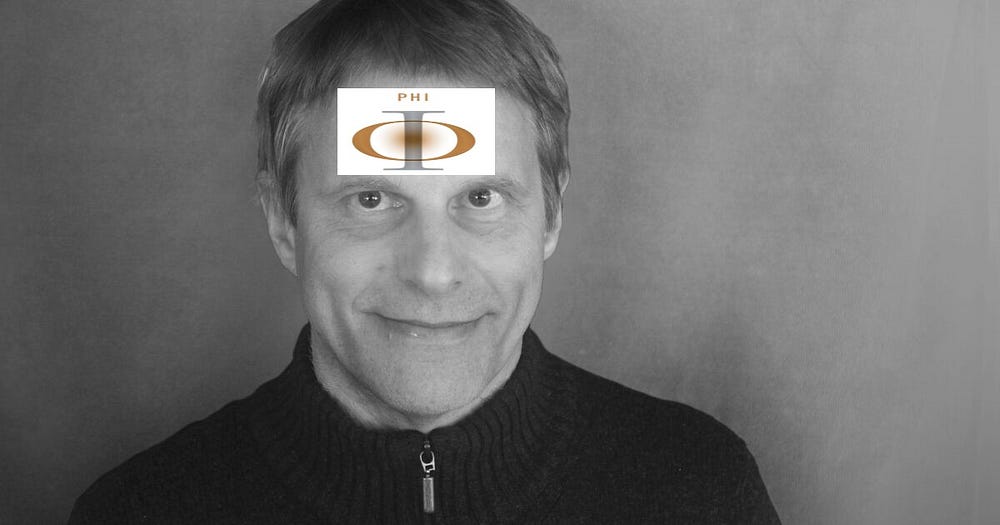Physicist and popular science writer Paul Davies asks his readers a fair amount of deep questions… But are his questions deep? Perhaps Davies’s questions only seem to be deep. In any case, many people are very good at asking deep questions about life, the Universe and everything. Some people also believe that they have very good answers to these deep questions. Indeed, Davies himself has some deep answers to his own deep questions.

This essay is a follow-up to my previous piece, ‘Physicist Paul Davies’s Faith in His Idea That Science is Founded on Faith’. Each essay is largely a response to Davies’s own op-ed article for the New York Times, ‘Taking Science on Faith’.
But, firstly, a few things need to be said.
An obvious reaction to the overall position expressed in this essay is to say that it’s philistine, crude, tribal and/or even lazy. That is, the rejection of these deep questions (or simply the questioning of them) will be seen to be philistine, crude, tribal and/or lazy by some of the people who hold similar views to Paul Davies. (Perhaps these people would also use the word scientistic about my overall position.) Indeed, Davies himself (kinda) hints at this stance in both his position on all those scientists he believes take science on faith; and, more particularly, to some of the critics of his op-ed article (see here).
Indeed, rejecting (or simply questioning) these questions could be a sign of a crude, philistine, tribal and/or lazy mind. However, that needn’t be the case. These deep questions have, after all, been questioned by many philosophers and scientists (including Ludwig Wittgenstein) for philosophical and logical reasons. That is, they haven’t simply been questioned (or rejected) for the hell of it or because these critical scientists or philosophers couldn’t be bothered finding out the answers. In other words, such philosophers and scientists have provided reasons for — and also justified — their criticisms of the these (supposedly) deep questions.
Paul Davies’s Deep or Specious Questions?
Physicist Paul Davies (1946 — ) discussed the dearth of deep answers when he wrote the following:
“If one traces these reasons all the way down to the bedrock of reality — the laws of physics — only to find that reason then deserts us, it makes a mockery of science.”
So the following is an example of a deep question:
Why are the laws of physics the way that they are?
To put Davies’s question in its original context:
“Over the years I have often asked my physicist colleagues why the laws of physics are what they are. The favorite reply is, ‘There is no reason they are what they are — they just are.’ The idea that the laws exist reasonlessly is deeply anti-rational.”
Davies also asks the following questions:
“[W]here do these laws come from?”
“[W]hy do they have the form that they do?”
What if these deep questions are themselves problematic?
That is, what if it’s not only the answers (or lack thereof) to these questions which is problematic, but the questions themselves?
The philosopher Gordon Park Baker (1938–2002) is of some help here.
In his ‘φιλοσοφια: εικων και ειδος’ (which can be found in Philosophy in Britain Today), Baker once wrote:
“We should [] make serious efforts at raising questions about the questions commonly viewed as being genuinely philosophical. Perhaps the proper answers to such questions are often, even if not always, further questions!”
All sorts of questions have been deemed to be deep, profound and worthy of serious thought. However, perhaps it’s just as important — and indeed just as philosophical — to ask questions about these questions. Or as Gordon Baker also put it:
“The unexamined question is not worth answering.”
Baker continued:
“To accept a question as making good sense and embark on building a philosophical theory to answer it is already to make the decisive step in the whole investigation.”
In addition, another problem is summed up by Gordon Baker. Thus:
“Questions, just as much as assertions, carry presuppositions.”
For variety’s sake, another deep question can be cited here:
(1) Why does the physical give rise to consciousness?
(In David Chalmers’ own words: “How do physical processes give rise to experience?” )
Now for a question that’s more relevant to the case of Paul Davies:
(2) Why are the constants of nature the way they are? (Or: Why do the laws of physics have the numerical values which they do have?)
Question (1) is specific to the philosophy of consciousness. And question (2) is very similar to Davies’s own questions.
(1) and (2) appear to be perfectly legitimate questions. Indeed, they may also appear to be deep questions. Or in the words of the theoretical physicist Sean M. Carroll:
“Why do the laws of physics take the form they do? It sounds like a reasonable question, if you don’t think about it very hard.”
Carroll goes on to state the following:
“And these questions have sensible answers — the sky is blue because short wavelengths are Rayleigh-scattered by the atmosphere, your car won’t start because the battery is dead, and Cindy won’t answer your emails because she told you a dozen times already that it’s over but you just won’t listen. So, at first glance, it seems plausible that there could be a similar answer to the question of why the laws of physics take the form they do.
“But there isn’t. At least, there isn’t any as far as we know, and there’s certainly no reason why there must be.”
So simply because a question is grammatical and even makes (some kind of) sense, then that doesn’t also mean that it’s a philosophically (or otherwise) legitimate question.
To back these claims up with an extreme (or even silly) example, let’s use a reworking of Noam Chomsky’s well-known surreal sentence. Namely:
Why do colorless green ideas sleep furiously?
However, now let’s take a question which some people have actually asked:
Why is water H₂O?
A (possible) answer is being presupposed in my own examples and perhaps with Davies’s questions too. That is, the very asking of these questions means that the questioner must assume that there are answers — at least answers in principle.
Yet, to use the words of Baker again, aren’t these questioners “taking certain things for granted”? That is, aren’t they primarily taking for granted that their questions are legitimate and that there are answers? Moreover, aren’t these questioners also “put[ting] some things beyond question or doubt”, as well as “treat[ing] some things as matters of course”?
Kitty Ferguson’s Deep or Specious Questions?
American science writer Kitty Ferguson (1941 — ) also asked various deep questions (as found in her bestselling book The Fire in the Equations).
For example, Ferguson asked us why the “fundamental forces” are the way they are. (This question also ties in with her other questions about their necessary or contingent nature.) Ferguson writes:
“[N]o scientific theory we have at present can tell us why the speed of light and the strengths of the fundamental forces of nature are what they are.”
So let’s reformulate that passage as a simple question:
Why is the speed of light, the strengths of the fundamental forces of nature, etc. the way that they are?
Can we dare to say that these values and strengths just are the values and strengths that they are?
After all, they have to be of some value and strength.
What’s more, isn’t the fact that they have the values and strengths that they have entirely contingent? (On one reading, Paul Davies isn’t necessarily denying this.)
Here Sean Carroll (again) has something to say on this subject too. He writes:
“The final possibility, which seems to be the right one, is: that’s just how things are. There is a chain of explanations concerning things that happen in the universe, which ultimately reaches to the fundamental laws of nature and stops.”
We can also use the words of Richard Feynman here.
Feynman came at this from a slightly different angle. So take Feynman's deep (if also ironic) question embedded within the following passage: He recalled:
“You know, the most amazing thing happened to me tonight. I saw a car with the license plate ARW 357. Can you imagine? Of all the millions of license plates in the state, what was the chance that I would see that particular one tonight? Amazing!”
This passage can be reformulated as a simple question:
Of all the millions of license plates in California, why did I see that particular one tonight?
Yet it’s not at all weird that Feynman should have seen that particular number plate. He had to see one number plate when he glanced at that particular time. So whichever numberplate he saw, the same astonished question could have been asked about it.
And that conclusion may also apply to any questions and astonishment people ask and display about the values the constants actually have, and also about what they might have had.
Yet perhaps there’s no deep answer — other than mundane facts about probabilities, etc. — to Feynman’s own question as to why he should have seen that particular number plate.
So, to admittedly stretch things a little, perhaps Feynman’s ironic question is similar to the following non-ironic question:
Why are the laws of physics and the constants of nature the way they are and why do they have the particular values that they have?
Basically, then, what if these deep questions don’t have answers (or solutions)? Moreover, what if these supposedly profound questions are specious, suspect or bogus in some way?
Despite saying all that, even if a question may not have an answer, reasons or explanations will still need to be given as to why that’s the case.
Take this more specific question:
Why is the speed of light exactly 299,792,458 metres per second?
The speed of light is exactly 299,792,458 metres per second because if it were slightly less (it can’t be more), then it wouldn’t be light. It would be something else.
The same goes for this question:
Why is the charge of an electron -1.6 x 10–19 coulomb and its mass 9.11 x 10–31 kilograms ?
The mass and charge of all electrons is x and y because if they weren’t that mass and charge, then they wouldn’t be electrons. They would be something else.
Now the tacit problem here begins to be seen when Ferguson expands her range of deep questions.
Ferguson then stated the same kind of thing about various symmetries found in the Universe. She wrote:
“[W]e might ask whether there are underlying reasons why this symmetry and not another should be the one to apply in our universe.”
We can also rephrase the passage above as a simple question:
What are the underlying reasons why this symmetry and not another one should be the one which applies in our Universe?
Again, there had to be some kind of symmetry — that is, if there’s any kind of symmetry at all. Sure, other kinds of symmetry might have been instantiated. They weren’t. (Again on the anthropic view, we can say that this question couldn’t have been asked without the given symmetries.)
Thus, perhaps the hidden questions are whether or not there was something before the Universe’s symmetries, something responsible for these symmetries, and/or something more basic than these symmetries.
But Ferguson didn’t stop there.
She then asked similar questions about mathematical logic. Thus:
“It’s a question of profound importance whether mathematical consistency required an Inventor. I’ve heard it asked at the end of public lectures on physics: ‘Is mathematical consistency as we know it the only way it COULD be — or is it conceivable it could be something different?…’ If the lecturer is a scientist or mathematician, he or she may answer that mathematical consistency just is.”
This too can be put as a simple question. (This time using Ferguson’s own words.) This is her question:
“Is mathematical consistency as we know it the only way it COULD be — or is it conceivable it could be something different?”
The idea that mathematical consistency would need an inventor may strike some (or even many) people as ridiculous. Nonetheless, it may still be a legitimate question.
That said, there’s little point in going into more detail about Ferguson’s deep questions about mathematics and logic because, I hope, the critical point should already be clear.
Conclusion
Perhaps there could be answers to Kitty Ferguson’s deep questions if the values and strengths of the constants and the given symmetries were necessary features of the Universe. Is that what she was hinting at? Thus, now it can be concluded that all her questions are also tangentially — as well as tacitly — linked to the anthropic principle. Indeed, in some cases at least, her questions (or their answers) seem to depend on the existence of God.
All that said, those conclusions can’t really be aimed at Paul Davies because he actually argues against such necessity when it comes to what he calls “the laws” of the Universe.
So, firstly, Davies puts the position of “scientists” in the following way:
“The laws were treated as ‘given’ — imprinted on the universe like a maker’s mark at the moment of cosmic birth — and fixed forevermore. Therefore, to be a scientist, you had to have faith that the universe is governed by dependable, immutable, absolute, universal, mathematical laws of an unspecified origin.”
Davies is clearly wrong about all scientists. However, he seems to be right about at least some.
Take Jerry A. Coyne (again).
The following passage from Coyne (aimed at Davies’s article ‘Taking Science on Faith’) is an expression of the scientific belief (if belief without what Davies calls “faith”) in what can be called Platonic laws, and why such a belief is justified. Thus:
“Contrary to Davies’ assertion, science is not based on ‘faith’ that physical laws will apply forever, or in different places in the Universe. This is an observation — an observation that has not been contradicted by any other data. Davies is completely off base when claiming that ‘to be a scientist, you had to have faith that the universe is governed by dependable, immutable, absolute, universal, mathematical laws of an unspecified origin. You’ve got to believe that these laws won’t fail, that we won’t wake up tomorrow to find heat flowing from cold to hot, or the speed of light changing by the hour. ‘ This is not a matter of faith. It’s a matter of experience. In contrast, the tenets of religion are truly based on faith, since there is no empirical data to support them.”
As an alternative to all that, Davies envisages a two-way and reciprocal relation between the Universe and “the laws” and the laws and the Universe. In other words, he rejects the idea that “the laws are completely impervious to what happens in the universe”. Indeed, in a response to the critics of his aforesaid article, Davies also tells us that is is
“assumed that the physical world is affected by the laws, but the laws are completely impervious to what happens in the universe — they are immutable”.
This is also — roughly — the position of the theoretical physicist Lee Smolin, who often refers to the “dynamical universe”. In addition, Smolin’s theory of Cosmological natural selection fits in with some (i.e., not all) of Davies’ own ideas. (Other contemporary theoretical physicists take similarly positions too.)
Ironically, in a fierce and rhetorical response to Davies’s article, the American biologist Paul Zachary Myers puts the dynamical view. (He also makes it clear that Davies conflates what he calls “scientists” with physicists.) Myers writes:
“[I]n a historical science like evolutionary biology, we have no problem when we encounter a phenomenon that isn’t orderly or rational, and that has all the appearance of haphazard meaninglessness. We’re accustomed to seeing simple chance as a strong thread running throughout biological history.”
Broadly speaking, this “dynamical” and “historical” view of biology — if not of physics — is captured by Murray Gell-Mann in his book The Quark and the Jaguar. Readers can also consult Gell-Mann on what he calls “frozen accidents”. However, this latter idea contradicts Paul Davies’s position because the accidents and the history only occur after the “fundamental laws” are already set in place. Not only that: these fundamental laws stay (to use Davies’s hyperbolic word) “immutable” despite the accidents and the history!
To return to Davies’s own position.
Davies even ties this take on Platonic laws to monotheism and the idea that “a rational being designed the universe according to a set of perfect laws”.
This means that rather than Davies emphasising what he calls “faith in science” to bolster religion and downplay science (as some — or even most — of his detractors argue), Davies’s argument actually seems to be the opposite. He’s arguing that science is still somewhat beholden to certain monotheistic (or religious) ways of viewing the Universe and its laws.
Despite stating all that, Davies’s (as it were) evolutionary (or historical) and dynamical view of the laws of the Universe still doesn’t mean that his questions are (in fact) deep or that they have answers.
To sum up.
Both Paul Davies and Kitty Ferguson are asking questions about what can (or what may) explain the values of the constants and the various symmetries found in the Universe. They’re also asking questions about what is responsible for — or what may explain — them. Finally, they want to know if there’s something more fundamental than all these things which can provide us with the ultimate deep answer to life, the Universe and everything.
My flickr account and Twitter account.












